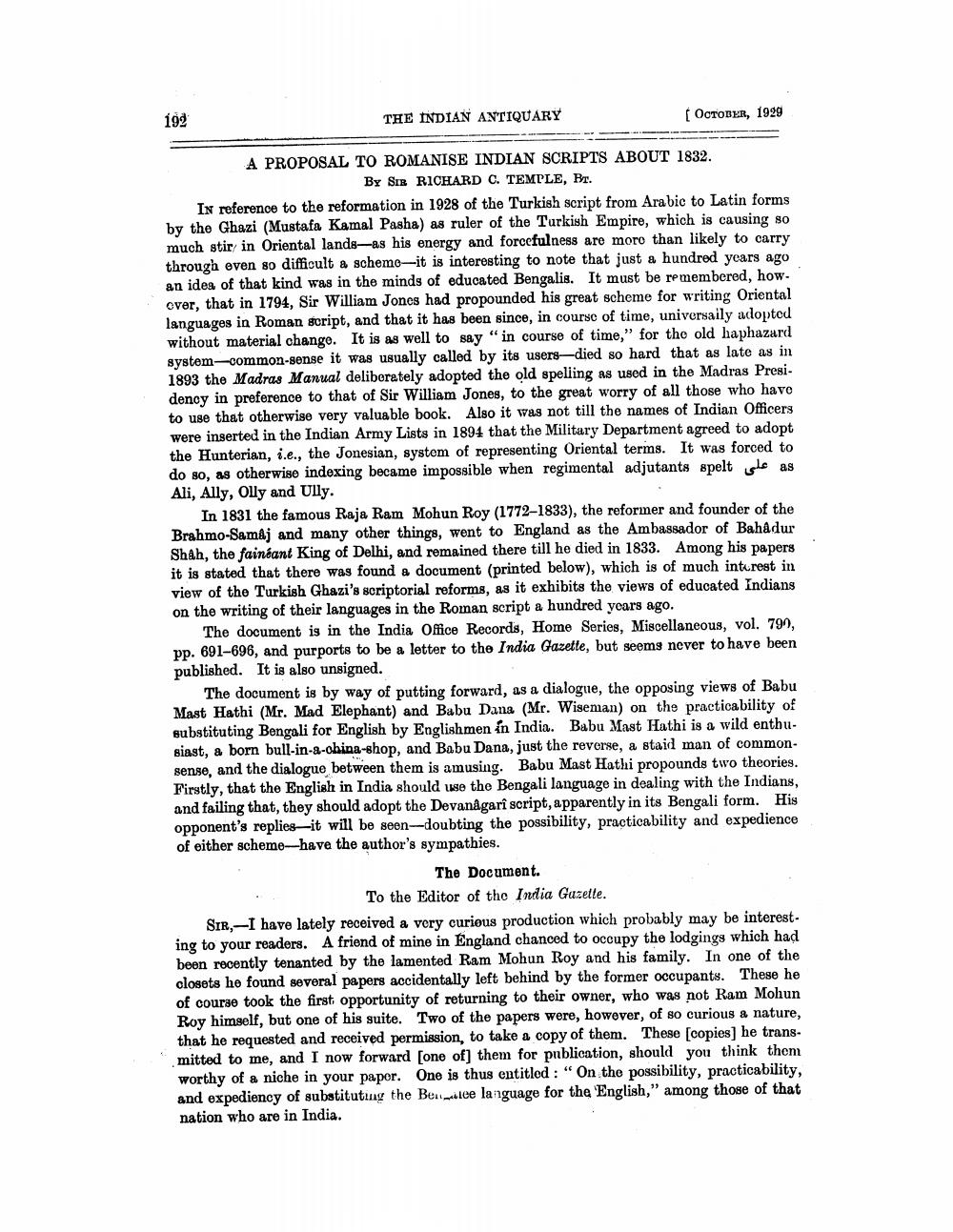________________
192
THE INDIAN ANTIQUARY
OCTOBER, 1929
A PROPOSAL TO ROMANISE INDIAN SCRIPTS ABOUT 1832.
BY SE RICHARD C. TEMPLE, Br. In reference to the reformation in 1928 of the Turkish script from Arabic to Latin forms by the Ghazi (Mustafa Kamal Pasha) as ruler of the Turkish Empire, which is causing so much stir in Oriental lands—as his energy and forcefulness are more than likely to carry through even so difficult a scheme-it is interesting to note that just a hundred years ago an idea of that kind was in the minds of educated Bengalis. It must be remembered, how over, that in 1794, Sir William Jones had propounded his great scheme for writing Oriental languages in Roman script, and that it has been since, in course of time, universaily adopted without material change. It is as well to say "in course of time," for the old haphazard system-common sense it was usually called by its users-died so hard that as late as in 1893 the Madras Manual deliberately adopted the old spelling as used in the Madras Presi. denoy in preference to that of Sir William Jones, to the great worry of all those who have to use that otherwise very valuable book. Also it was not till the names of Indian Officers were inserted in the Indian Army Lists in 1894 that the Military Department agreed to adopt the Hunterian, i.e., the Jonesian, system of representing Oriental terms. It was forced to do so, as otherwise indexing became impossible when regimental adjutants spelt als as Ali, Ally, Olly and Ully.
In 1831 the famous Raja Ram Mohun Roy (1772-1833), the reformer and founder of the Brahmo-Samaj and many other things, went to England as the Ambassador of Bahadur Shah, the fainéant King of Delhi, and remained there till he died in 1833. Among his papers it is stated that there was found a document (printed below), which is of much interest in view of the Turkish Ghazi's scriptorial reforms, as it exhibits the views of educated Indians on the writing of their languages in the Roman script a hundred years ago.
The document is in the India Office Records, Home Series, Miscellaneous, vol. 799, pp. 691-696, and purports to be a letter to the India Gazette, but seems never to have been published. It is also unsigned.
The document is by way of putting forward, as a dialogue, the opposing views of Babu Mast Hathi (Mr. Mad Elephant) and Babu Dana (Mr. Wiseman) on the practicability of substituting Bengali for English by Englishmen in India. Babu Mast Hathi is a wild enthusiast, a born bull-in-a-china-shop, and Babu Dana, just the reverse, a staid man of commonsense, and the dialogue between them is amusing. Babu Mast Hathi propounds two theories. Firstly, that the English in India should use the Bengali language in dealing with the Indians, and failing that, they should adopt the Devanagari script, apparently in its Bengali form. His opponent's replies-it will be seen-doubting the possibility, practicability and expedience of either scheme--have the author's sympathies.
The Document.
To the Editor of the India Gazette. SIR, I have lately received a very curious production which probably may be interesting to your readers. A friend of mine in England chanced to occupy the lodgings which had been recently tenanted by the lamented Ram Mohun Roy and his family. In one of the closets he found several papers accidentally left behind by the former occupants. These he of course took the first opportunity of returning to their owner, who was not Ram Mohun Roy himself, but one of his suite. Two of the papers were, however, of so curious a nature, that he requested and received permission, to take a copy of them. These (copies) he transmitted to me, and I now forward [one of] them for publication, should you think them worthy of a niche in your papor. One is thus entitled: "On the possibility, practicability, and expediency of substitutuy the Belimitee language for the English," among those of that nation who are in India.




